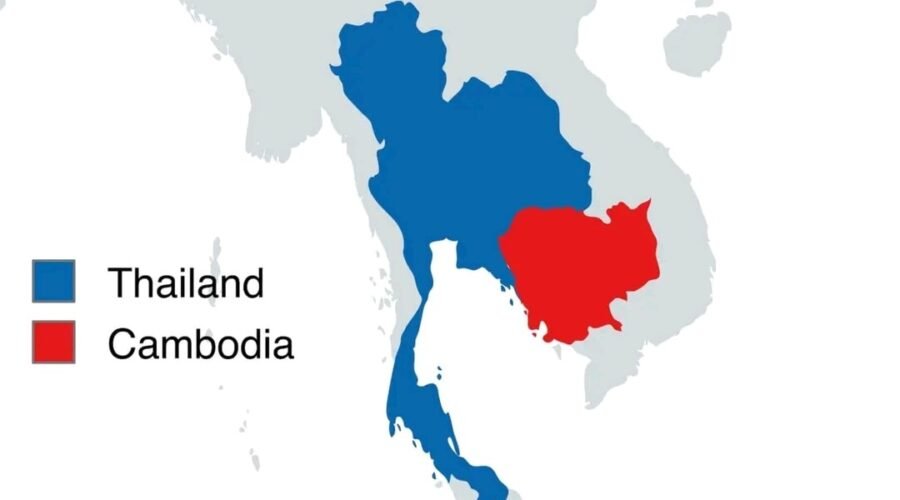Thailand has captured the world’s attention after an F-16 fighter jet launched a precision strike on Cambodian military targets, escalating a century-old border dispute. The incident, which unfolded near the legendary Emerald Triangle where Thailand, Cambodia, and Laos converge, has become one of the most searched and trending topics in the UK this week. Reports of casualties, closed borders, and urgent diplomatic activity highlight the gravity of this flashpoint, which threatens stability in the Southeast Asian region.
What Sparked the Latest Conflict?
Thursday morning saw fierce fighting near the ancient Ta Muen Thom temple on the contested border between Surin province in Thailand and Oddar Meanchey in Cambodia. Skirmishes broke out after Thai forces detected a Cambodian drone. Within hours, artillery, rockets, and gunfire had claimed at least a dozen lives, including civilians and children. The Royal Thai Army responded by deploying six F-16s, one of which delivered a targeted bombing run against Cambodian positions.
Cambodia condemned the move and called it reckless aggression. Both nations accused the other of starting the confrontation. Cambodian sources claimed the Thai fighter jet bombed a roadway near the UNESCO-listed Preah Vihear temple. Thailand accused Cambodia of firing on civilian locations, including hospitals and petrol stations. The fallout ended in tightened travel restrictions, the closure of all border crossings, and mass civilian evacuations.
Historical Rivalry Fuels Modern Crisis
The dispute between Thailand and Cambodia stretches back to colonial times. At the heart of the argument sits control over several ancient temples. Tensions have flared repeatedly, most infamously in 2011, but this latest episode marks the deadliest violence in over a decade. Earlier this year, the killing of a Cambodian soldier reignited nationalist feeling in both nations, drawing ordinary people as well as politicians into the fray.
The two governments have expelled each other’s ambassadors, and official statements have turned sharply adversarial. Cambodia requested UN intervention, while Thailand warned it may escalate defence measures if hostilities continue. The region remains locked down, with reports of thousands displaced and military build-ups on both sides.
Warnings for Tourists and the Travel Industry
Thailand remains a beloved destination for UK travellers, famous for its vibrant cities and white-sand beaches. The Foreign, Commonwealth and Development Office (FCDO) has updated its guidance for British nationals with trips planned to the country. Britons are urged to avoid all travel near the border, remain vigilant, and heed advice from local authorities. Unexploded landmines pose ongoing threats in affected areas. Health officials have reported casualties among both locals and foreigners, and major tour operators are monitoring the situation. Thailand’s booming tourism sector faces renewed risks from this escalation.
Political Aftershocks Within Thailand
The unrest at the border coincides with deep political instability within Thailand. The country’s prime minister, Paetongtarn Shinawatra, was suspended following a leaked recording in which she criticised the military and appeared deferential to Cambodia’s long-serving political leader, Hun Sen. Accusations of ethical breaches and a fragile coalition have spurred mass protests in Bangkok. Foreign investors are anxious about the direction of both the government and the economy. The stock market has suffered, and the Thai baht is near a three-year low.
This turbulence has historical roots, with Thailand experiencing regular coups and court-ordered dissolutions in recent decades. Analysts warn that without decisive action, instability could push Thailand further into economic uncertainty, with ripple effects for UK-based businesses and holidaymakers.
Social Media Erupts as News Trends Across the UK
Breaking news of Thailand’s actions has flooded social media platforms in the UK. Hashtags related to the border clash and Thailand’s political drama have trended across X and Facebook. Many British expats and tourists have shared first-hand accounts, while fact-checking efforts by UK news outlets provide a clearer picture of the sequence of events. Newsrooms are prioritising updates, given the popularity of Thailand as a travel destination for Brits and its importance to regional geopolitics.
The Road Ahead: Calls for De-escalation
Both Bangkok and Phnom Penh have sent mixed signals over whether they will de-escalate or retaliate. Diplomatic and military leaders now find themselves under fire at home and abroad, as local and international media call for an immediate ceasefire. UK-based observers stress the need for mediation and warn of humanitarian consequences if the situation deteriorates further.

